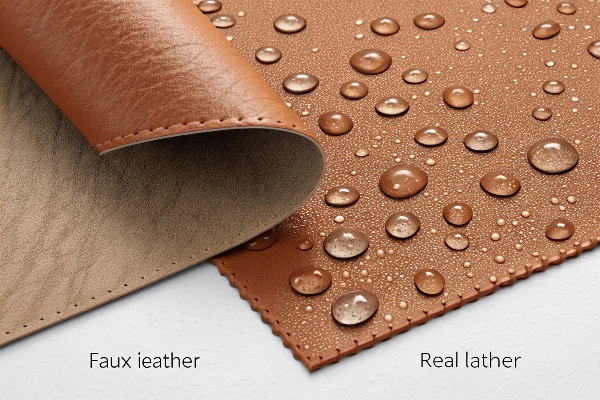The fear of a sudden spill or rainstorm can freeze anyone who loves faux leather products.
Faux leather resists light moisture because of its plastic coating, yet it is not fully waterproof; water can seep through seams or degrade the surface over time.

A quick answer calms worry, but a deeper look saves money. Stay with me and I will show clear steps to keep your faux leather safe in every wet scene.
What happens if faux leather gets wet?
A few drops on the surface seem harmless, but hidden damage may start the moment water sits too long.
When faux leather gets wet, water may pass through stitching holes, lifting the thin plastic layer from its fabric backing. This can lead to bubbling, cracking, or mildew if the item dries slowly in a humid place.

Why surface water is not the only issue
I once left a faux leather sample on a showroom chair after wiping it with a damp cloth. It looked dry by sight, yet small blisters formed the next day. The plastic film separated from its polyester base.
What happens inside
| Layer | What water does | Result |
|---|---|---|
| PU/PVC film | Loosens if soaked | Peeling, loss of gloss |
| Fabric backing | Absorbs water | Odor, mildew |
| Adhesive layer | Weakens | Bubbles |
Simple rescue steps
- Blot with a dry towel at once.
- Stuff the item with paper to keep shape.
- Air-dry in shade, never under direct sun or a hair dryer.
- Apply a PU conditioner once dry.
Does faux leather need to be waterproofed?
The promise of “easy care” tempts many buyers, yet skipped maintenance often leads to early cracks.
Faux leather benefits from extra waterproofing sprays; these create a thin barrier that slows water entry without changing color or feel.

The logic of added defense
Clients ask me why we should seal a plastic-based material. The answer sits in its seams. Water sneaks in through needle holes and edges where the coating ends.
Picking the right product
| Spray Type | Safe for PU | Dry Time | How long it lasts |
|---|---|---|---|
| Silicone-based | Yes | 1 hour | 4 weeks |
| Fluoropolymer | Yes | 30 min | 8 weeks |
| Wax cream | Risk of haze | 2 hours | 6 weeks |
My tested routine
I mist the spray from 20 cm away, let it dry, then buff lightly with a microfiber cloth. I repeat every change of season. This helped a customer’s faux leather sofa survive a toddler’s juice attack last month.
Is it okay to wear faux leather in the rain?
Rain can turn a proud outfit into a worry. The short answer is yes, but prepare.
You can wear faux leather in light rain if you wipe it dry soon; prolonged soaking or heavy downpour can weaken seams and leave water spots.

Smart habits for storm days
I rode a scooter through a sudden shower while wearing a PU jacket. The jacket survived because I followed basic care later.
Post-rain checklist
- Hang the item on a wide hanger.
- Pat dry with a towel.
- Let air move around it.
- Finish with a thin coat of conditioner.
Why timing matters
| Time water stays | Damage risk |
|---|---|
| < 10 minutes | Low |
| 10–30 minutes | Medium, minor edge swelling |
| > 30 minutes | High, film lift and odor |
Extra layer idea
A thin, breathable rain shell over faux leather keeps style intact and lifts stress. I keep one folded in my bag on travel days.
What are the disadvantages of faux leather?
Low cost and vegan appeal draw shoppers, yet every material has trade-offs.
Faux leather can crack, trap heat, and lack the long-term patina of real leather; environmental recycling remains tricky because of mixed layers.

A clear comparison
| Feature | Faux Leather | Real Leather |
|---|---|---|
| Breathability | Low | High |
| Lifespan | 2-5 years | 10+ years |
| Aging look | Peels | Gains character |
| Repair ease | Hard | Possible |
| Price | Low | High |
Heat and sweat story
I wore faux leather seats during a summer test drive in Dubai. After thirty minutes, my back felt sticky. The solid PU layer blocks airflow, trapping body heat.
Crack cycle
- UV light dries the film.
- Flex points weaken.
- Small cracks form.
- Water enters, making the cracks grow.
Eco notes
Recycling is hard. PU bonds tightly with fabric, so separation costs more energy than making new material. However, bio-based PU and solvent-free lines from my factory reduce VOCs by 40%.
Conclusion
Faux leather handles splashes with care, yet seams and time let water and wear inside. A spray, quick drying, and gentle habits keep your items looking sharp for years.

